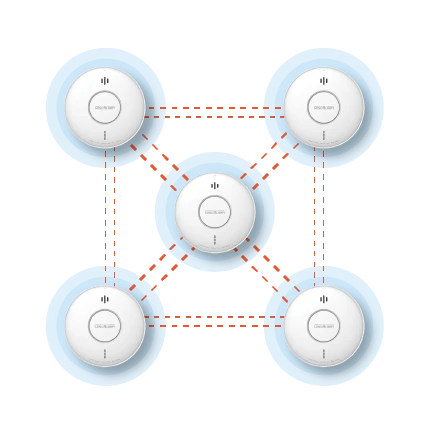
Need assistance?
Need Assistance? Call Us 0330 058 0630
14/10/2024 • by Alice P
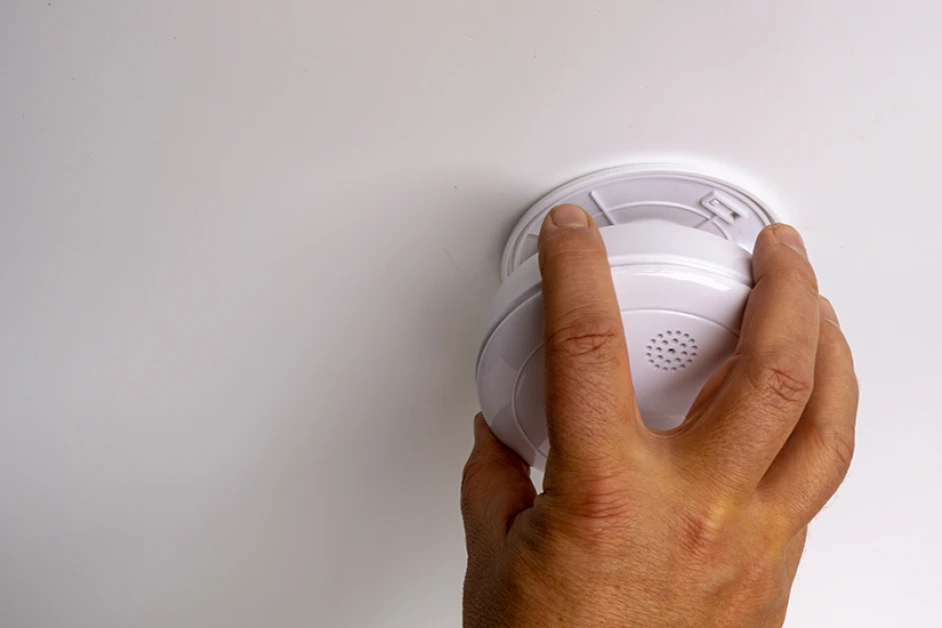
Fire alarms for the home are devices that are used to detect smoke or fire in your property. They operate through a heat and smoke activated system. On detection of smoke, they sound an alarm to alert people of fire danger. Fire alarms are essential to creating fire safe, protected environment.
This article explains the differences between battery powered and mains-powered fire alarms. It also discusses why fire alarms are important. Finally, it helps you choose the best fire alarm for your home.
The main difference between a battery fire alarm and a mains powered fire alarm is how they are powered.
Battery fire alarms receive power solely from either a replaceable battery or a lithium-ion battery.
Mains powered fire alarms connect directly to the home’s power supply through a permanent mains feed. Mains powered alarm usually feature a backup battery in case of a power failure.
The way a fire alarm works depends on the sensor technology it uses. Fire alarms use one of two technologies to detect fire: photoelectric and ionisation.
Photoelectric smoke detectors use light to detect smoke. These devices contain a light source inside the chamber. If smoke fills the chamber, the light source is blocked. The light reflects off the smoke into a photocell, which triggers the alarm.
Ionisation smoke detectors use a small amount of radioactive material to ionise the air in the sensor. When smoke enters the detector, it disrupts the flow of the ions and triggers the alarm.
Manufacturers in the UK are slowly phasing out the production of ionisation smoke alarms. This is due to the difficulty involved in discarding the radioactive material. Additionally, these detectors have a higher chance of producing false alarms in response to dust or steam. As a result, photoelectric fire alarms are most widely used.
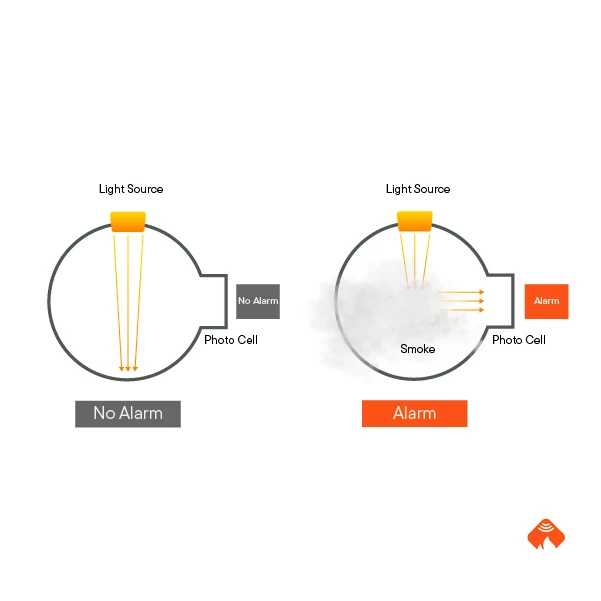
You can quickly and easily install battery powered fire alarms in your home without an electrician.
Battery powered fire detectors are easy to remove. You can easily remove alarms when decorating or moving property, for instance.
You can easily replace batteries, boosting the convenience of the battery powered alarm.
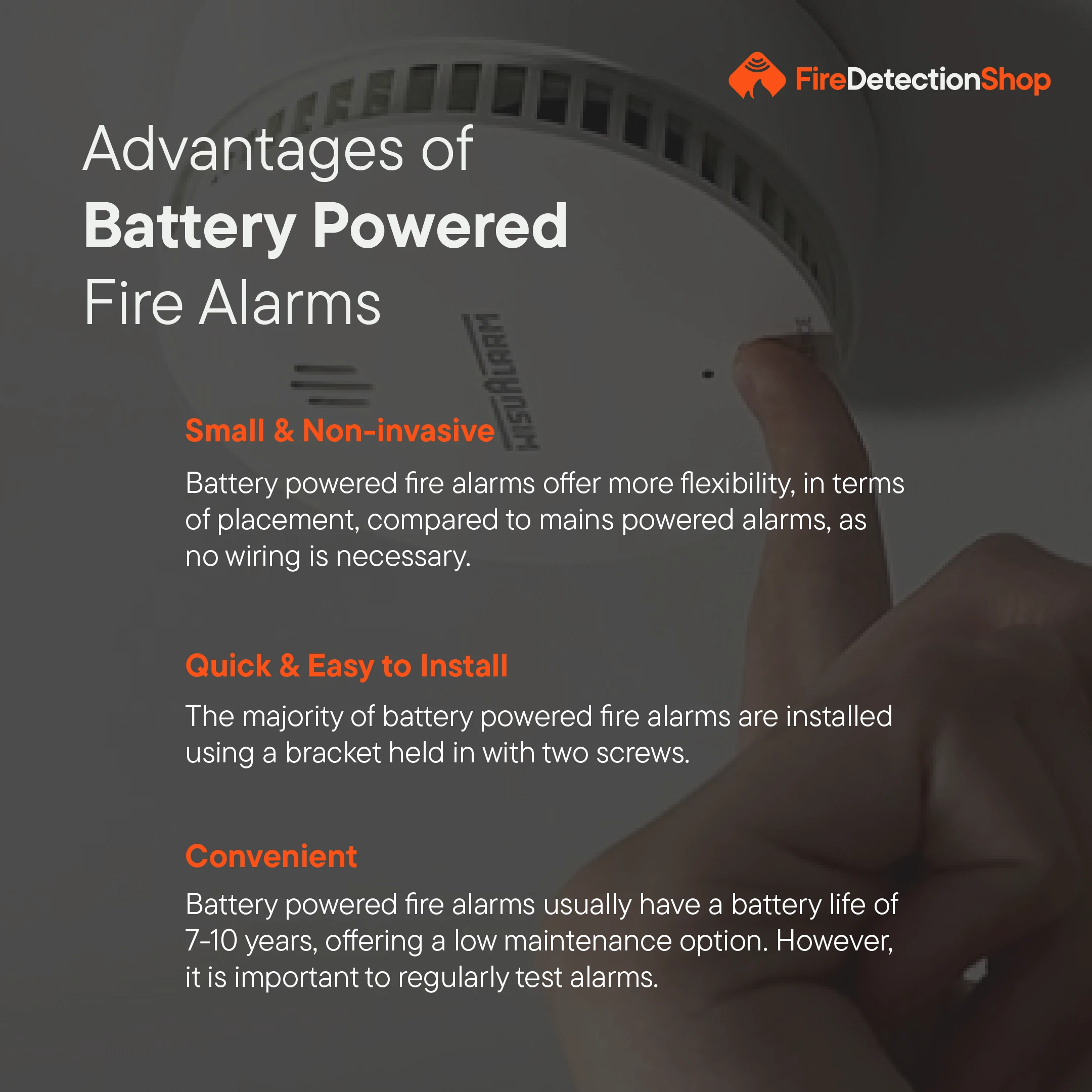
Once a battery loses power the alarm will stop working. The average lifespan of a battery powered alarm is 10 years.
Batteries contain harmful chemicals. If people do not dispose of them properly, they can cause great harm to the environment. You may need to change the batteries in these alarms. Finding the correct facility to recycle them can be hard. Find a recycling centre.
Battery powered alarms are more susceptible to wear and tear.
Interconnectivity: This means that if one alarm is triggered it alerts all the alarms. This gives people more time to respond. It also provides better protection, keeping them safe no matter where they are in the house.
Longer life span: They lower the inconvenience of constantly checking battery life. They also cut costs by replacing or fixing faulty batteries too soon.
Reliable power supply: With a connection to mains power and a battery for backup power supply, mains powered fire alarms offer a reliable power supply.
Complex wiring: Mains powered fire alarms must be connected to the home’s electrical system making installation more complex than installing a battery powered device.
Disruptive installation: Installing a main-powered fire alarm involves drilling and running wires through walls. This can be a messy, invasive process which can increase stress and costs.
Higher costs: These alarms can become more expensive with higher upfront and maintenance costs. Despite not needing battery changes mains-powered alarms need to be regularly tested to ensure their effectiveness is not damaged through wear and tear.
Fire alarms should be placed in most rooms in your property where a fire can start. Installing fire alarms in your hallway and landing is not enough protection. In areas where there is smoke and steam, such as kitchens and bathrooms, a heat alarm is recommended.
It is recommended that your smoke alarm should be tested at least once a month. Testing a home fire alarm is quick and simple and does not require specialist knowledge or help.
Locate the test button and press the button until the alarm sounds. If it doesn’t respond the battery may need replacing. For a thorough test, a fire alarm can also be tested by using a synthetic smoke alarm test aerosol.
If a fire alarm starts to chirp, despite the battery being newly changed, an electrician may need to be called to change the alarm. You should test your fire alarm at least once a month and replace the batteries if necessary.
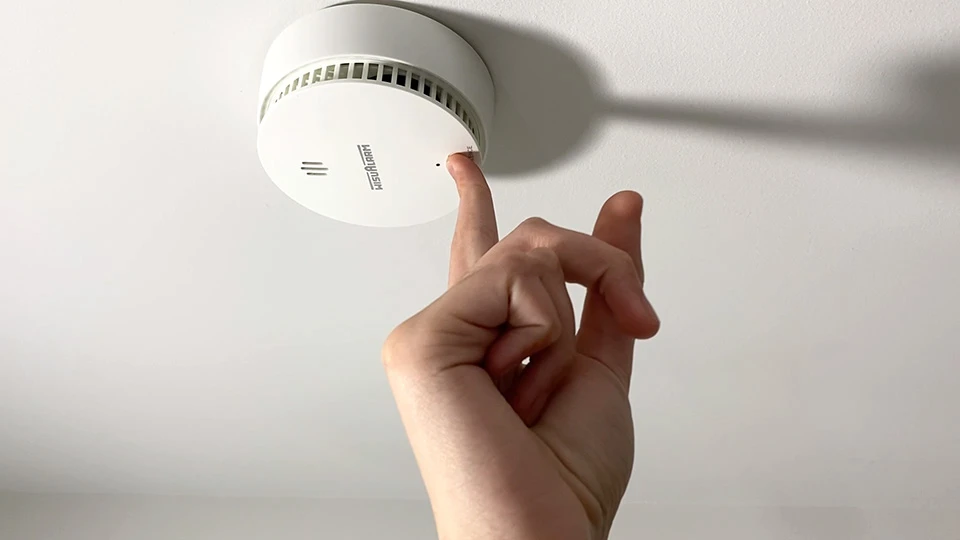
At Fire Detection Shop we offer a range of smoke and heat alarms for your home. We supply various well-known brands, such as Wisualarm and FireAngel, that comply with British Standards.
The Wisualarm collection features a range of battery powered and mains powered smoke and heat alarms for your home. With a sleek design, the Wisualarm, offers a modern fire detection solution. These alarms have many features, including:
Reduced false alarms: The Wisualarm detects smoke through its split-spectrum technology. This system distinguishes smoke from vapour or dust, eliminating false alarms.
Silence via remote control: Any infrared remote control, such as a TV remote, can mute the alarm. This removes the danger of needing to climb a ladder to silence the alarm. This silences the alarm rather than turning it off. This ensures the smoke alarm function will keep working.
Interconnectivity: WisuLink technology ensures that all the fire alarms in the house are interconnected. If an alarm is triggered in one room, it will trigger all other connected alarms. If desired, the Wisualarm can be purchased as a standalone unit.
Quick and easy installation: The fire alarm can be installed using the supplied screws and bracket or adhesive sticker.
Remote monitoring: The Wisualarm Mobile app is the perfect solution to keeping homeowners alert to fire even if they are not at home. The App will notify the homeowner’s phone as soon as the smoke alarm has been triggered.
Choosing the right fire alarm for your home comes down to preference and the infrastructure of your house. Battery-operated fire alarms offer more of a short-term solution to alerting a house to fire danger. You can set them up quickly and easily. Additionally, you can install them without needing an electrician.
Many people regard mains powered fire alarms as more reliable. However, these aren’t as easy to install as battery powered fire alarms. Mains powered fire alarms may require a qualified electrician to install them.
If you are a landlord seeking advice, read our guide on a landlord’s guide to fire alarms for more information.
